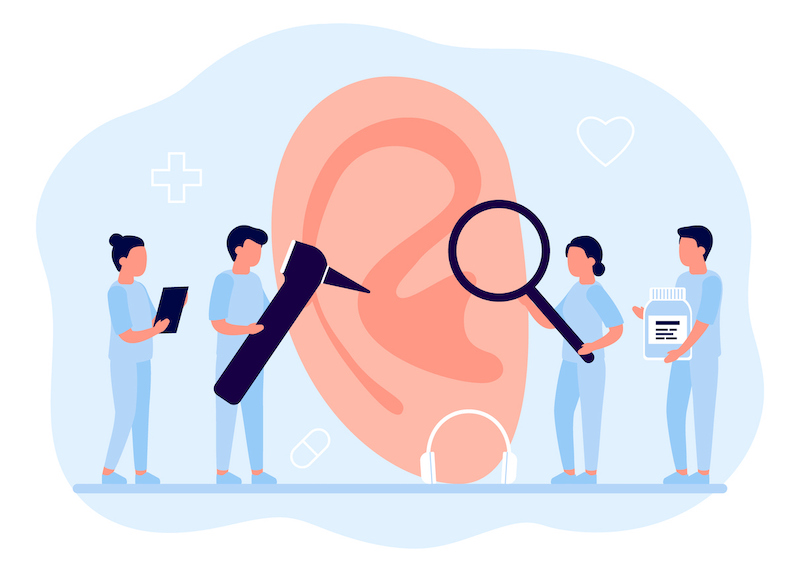“Is my hearing loss reversible?”
When our patients learn that they indeed have hearing loss, one of the first questions we hear is, “Is my hearing loss curable?” The unfortunate truth is that hearing loss is not curable. Why? Well, let’s explore what happens in the body when hearing loss occurs.
Though there are different types of hearing loss, the most common type of hearing loss is called sensorineural hearing loss.
Sensorineural hearing loss happens when damage happens in the inner ear. There are tiny hair cells in our cochlea and on the neural pathways that connect the inner ear to the brain. When these hairs are harmed, they die, and unlike many other hairs or cells on our bodies, they cannot regrow.
The result of these damaged hairs? Permanent hearing loss of certain frequencies at specific volumes. Soft sounds become softer, if not altogether imperceptible. Louder sounds lose their clarity. The ability to distinguish speech sounds in noisy environments becomes difficult, and these loud situations become exhausting for the person experiencing them to endure.
What causes damage to the inner ears’ hair cells? There are several sources.
The most common reasons we get sensorineural hearing loss
- Aging — Age-related hearing loss, or presbycusis, is the natural degradation of hearing function, affecting approximately half of adults by the time they reach 75 years of age
- Genetics — Some people are genetically predisposed to hearing loss
- Exposure to loud noises — Loud noises, either through prolonged exposure via occupational hazards or unsafe lifestyle choices, or in single bursts like those from close-range fireworks or gunfire, can cause permanent hearing loss
- Ototoxic medications — Though there are more than 200 medications considered toxic to our hearing, the most common include salicylate pain relievers, some chemotherapy drugs, and many loop diuretics
- Head injuries — Traumatic head injuries, like those that can happen in some full contact sports or in occupational or recreational accidents, can cause damage to the brain or inner ear, causing hearing loss
Hearing loss isn’t curable, but is it treatable? Yes!
Though it’s true that we cannot regenerate hair cell growth in the inner ear or fix damage to the auditory nerve, this does not mean that you have no choice but to live with your hearing loss.
In fact, in many cases, sensorineural hearing loss is treatable! How? Digital hearing aids!
Hearing aids have been proven to create drastic improvements in a person’s life, from their ability to hear and communicate better, to their ability to enjoy the things people love best with those they care about the most. What’s more, properly fit, appropriately worn hearing aids can protect the hearing you still have while delaying the effects of continued hearing loss.
What does the hearing treatment process look like?
Before you invest in hearing technology, we believe that it is essential you have your hearing tested.
At Colorado Ear Care, we place a high priority on giving you and all of our patients the tests that will give us the most accurate and comprehensive understanding of your hearing loss, so that our treatment recommendations will best help you achieve your hearing goals.
Our hearing testing process consists of three essential steps: your case history, comprehensive testing, and personalized recommendations.
Case history
The case history step in your better hearing evaluation is essentially an interview, where we not only get to know you better, but we also get a deeper understanding of what symptoms you’ve been experiencing, how you like to spend your time, and which listening situations will be most vital to your treatment recommendations.
The questions during your interview will consist of queries like:
- “How long have you suspected you have hearing loss?”
- “What type of work do you do? Are you exposed to loud noise there?”
- “Do your ears ever hurt or feel ‘full?’”
- “Do your ears ever ring, buzz, or pulse?”
- “Do you ever have issues with dizziness or feelings of imbalance?”
These questions, in conjunction with others will help inform which test will be most vital to your consultation.
Testing
This phase of the evaluation consists of three parts: checking for mechanical problems, measuring the sensitivity of your hearing, and measuring your understanding of speech.
Mechanical testing focuses on looking for obstructions like earwax or other debris, as well as conducting tests that verify proper functioning of both your eardrum and the bones in your middle ear.
The hearing sensitivity test takes place in a soundproof booth, presenting you a variety of tones played at different volumes, which can tell us what frequencies you’re missing and at what levels you cannot perceive them.
The speech understanding test tells us about your ability to hear certain speech sounds and at what volumes you need to hear them in noisy environments, giving us essential data on how beneficial hearing devices would be for your type of hearing loss.
Recommendations
Based upon your test results, we’ll either refer you to an otolaryngologist for hearing loss that is medically treatable, or we’ll present you with hearing aid options.
Though we personalize the programming of every device to the wearer’s specific hearing needs, we want to make sure that you’re as comfortable as possible and can truly perceive the benefits of your technology, which is why we, as a standard, offer 1-week demos of devices that allow you to wear your hearing aids, risk-free in the environments that matter most to you.
Ready to learn more? Contact Colorado Ear Care TODAY for your better hearing consultation!

